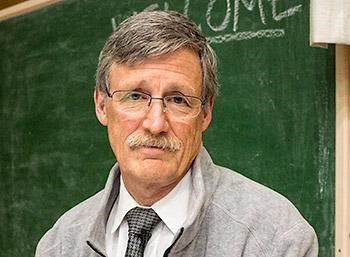Health protections for a proposed coal export expansion project are greater in the Lower Mainland than on Texada Island, according to a public health doctor from the United States.
Dr. Frank James, a public health officer for San Juan County in Washington State, travelled back to the Powell River area over the weekend to speak about the health impacts of a proposal to ship Wyoming coal to Asia through Fraser Surrey Docks (FSD) and Texada. James gave a presentation about his concerns in August in Powell River. On this visit he spoke on Texada and at Tla’amin (Sliammon) First Nation the following day.
About 75 people attended James’s presentation at the Gillies Bay Community Hall on Texada Saturday evening, October 19.
“If you review the proposed health protections that are being offered at this point, you’ll find one startling thing,” James said. “The health protections that are being offered in the plan for people who live in Delta are much, much greater than health protections that you’ll be offered.”
FSD has applied to Port Metro Vancouver for a project permit to build coal-handling facilities within its existing terminal operations that would allow the direct transfer of coal from trains to barges. The barges would carry coal to Texada Quarrying Ltd., owned by Lafarge Canada Inc., where it would be stored before transfer to deep-sea vessels for export to Asia.
In Delta, there will be an additional coating of material to keep the coal from blowing out of the train cars, two instead of one, James said. “They’re going to bring them into a sealed building that probably will have negative air pressure so that the dust can’t get out of it,” he said. “They will not be allowed to store it outside at all. That isn’t going to be the situation here. It’s rather dramatically different.”
James is one of the founding members of Whatcom Docs, a group of over 200 Whatcom County physicians who are concerned about the health and safety impacts of a proposed Cherry Point coal-shipping terminal in Washington State. They have called for an independent, objective health impact assessment of the project, including the impacts of transporting coal throughout local communities.
BC’s provincial health officer, Dr. Perry Kendall, Dr. Patricia Daly, Vancouver Coastal Health’s chief medical health officer, Dr. Paul Van Buynder, Fraser Health Authority’s chief medical officer, and Dr. Paul Martiquet, Vancouver Coastal Health’s medical health officer for the Sunshine Coast, Sea to Sky, Bella Bella and Bella Coola, have all called for an independent health impact assessment of the proposal.
Coal dust is known to cause chronic bronchitis, emphysema, pulmonary fibrosis, as well as environmental contamination through the leaching of toxic heavy metals. “Coal dust blows off the piles,” James said. “Sprays or water decrease that some, but are not fully effective.”
Diesel particulate matter, which comes from the stacks of ships and heavy machinery used to move coal, and has been shown to impair pulmonary development in children and to increase heart disease from all causes, were among some of the findings James talked about.
The transportation, storage and combustion of coal all lead to significant problems, James said. “I think there is potentially significant suffering and death because of this activity.”
A health impact assessment would determine if the risks could be mitigated, James also said. “People who tell you that they know it’s not a problem shouldn’t have the confidence that they have, because I know you can’t answer that question without knowing a lot more information than what is on the table right now.”
During the question and answer section of the meeting, speakers talked about how the proposal has divided the community. They pointed out that no one from Lafarge was present and neither was Powell River Regional District Director Dave Murphy, who represents Texada on the regional board.
James said that he has never said he’s opposed to the proposal, but that he is concerned about the health impacts. “Jobs are great,” he said. “Let’s have jobs. Let’s have all the jobs we can have. But let’s not pay the price in people’s lives and health for those jobs. Socializing that cost and privatizing that profit ain’t okay.”



